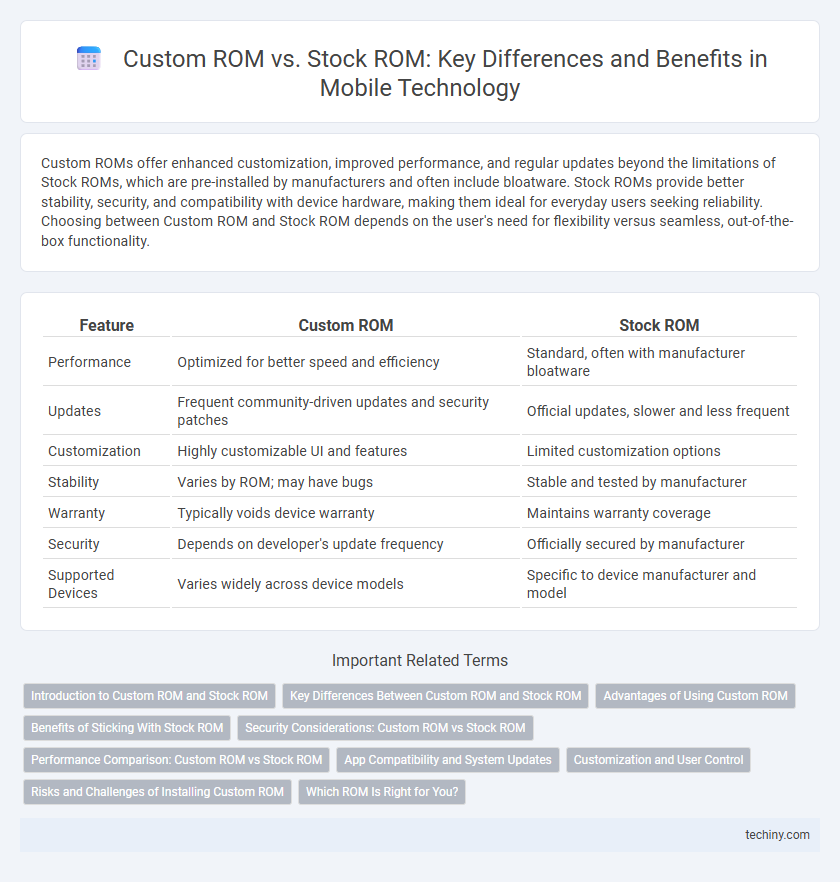Custom ROMs offer enhanced customization, improved performance, and regular updates beyond the limitations of Stock ROMs, which are pre-installed by manufacturers and often include bloatware. Stock ROMs provide better stability, security, and compatibility with device hardware, making them ideal for everyday users seeking reliability. Choosing between Custom ROM and Stock ROM depends on the user's need for flexibility versus seamless, out-of-the-box functionality.
Table of Comparison
| Feature | Custom ROM | Stock ROM |
|---|---|---|
| Performance | Optimized for better speed and efficiency | Standard, often with manufacturer bloatware |
| Updates | Frequent community-driven updates and security patches | Official updates, slower and less frequent |
| Customization | Highly customizable UI and features | Limited customization options |
| Stability | Varies by ROM; may have bugs | Stable and tested by manufacturer |
| Warranty | Typically voids device warranty | Maintains warranty coverage |
| Security | Depends on developer's update frequency | Officially secured by manufacturer |
| Supported Devices | Varies widely across device models | Specific to device manufacturer and model |
Introduction to Custom ROM and Stock ROM
Custom ROMs are aftermarket firmware developed by independent developers to replace the device's original operating system, offering enhanced customization, performance improvements, and access to the latest Android versions beyond manufacturer updates. Stock ROMs are the official firmware pre-installed by the device manufacturer, ensuring stability, manufacturer-specific features, and reliable security patches tailored to the hardware. Choosing between Custom ROM and Stock ROM depends on the user's preference for customization, system stability, and update frequency in mobile technology.
Key Differences Between Custom ROM and Stock ROM
Custom ROMs offer enhanced customization, performance optimization, and frequent updates compared to Stock ROMs, which maintain original manufacturer settings and stability. Stock ROMs provide guaranteed device compatibility, official security patches, and warranty support, whereas Custom ROMs may lack official updates and pose warranty risks. Users seeking personalized features and improved control often prefer Custom ROMs, while those prioritizing reliability and manufacturer support opt for Stock ROMs.
Advantages of Using Custom ROM
Custom ROMs offer enhanced performance and extended device lifespan by optimizing system resources beyond stock limitations. They provide users with greater customization options, including advanced privacy controls, unique themes, and additional features not available in stock ROMs. Frequent updates and the removal of bloatware further improve security and overall user experience on mobile devices.
Benefits of Sticking With Stock ROM
Stock ROM offers enhanced system stability and optimized performance as it is specifically tailored by the manufacturer for each device model. It ensures regular security updates and official support, reducing vulnerability to malware and software glitches. User experience remains seamless with guaranteed compatibility for apps and features, preserving device warranty and simplifying maintenance.
Security Considerations: Custom ROM vs Stock ROM
Stock ROMs generally offer better security since they receive regular official updates and patches directly from device manufacturers and Google, ensuring timely defense against vulnerabilities. Custom ROMs, while customizable, may lack consistent security updates and could introduce risks due to unofficial modifications and potentially unverified code sources. Users prioritizing security should weigh the reliability of official security patches in Stock ROMs against the flexibility and potential vulnerabilities present in Custom ROMs.
Performance Comparison: Custom ROM vs Stock ROM
Custom ROMs often provide enhanced performance by optimizing system resources, removing bloatware, and enabling advanced tweaking options compared to Stock ROMs. Stock ROMs maintain manufacturer-tested stability and compatibility but may include unnecessary background services that slow device speed and reduce battery life. Benchmark tests frequently show Custom ROMs deliver smoother multitasking and higher frame rates in gaming due to streamlined code and updated kernels.
App Compatibility and System Updates
Custom ROMs often provide enhanced app compatibility by supporting a wider range of apps and features not available on Stock ROMs, which are limited to manufacturer and carrier restrictions. Stock ROMs deliver timely and reliable system updates directly from device manufacturers, ensuring optimal security and performance consistency. Users prioritizing seamless app functionality and frequent updates typically prefer Stock ROMs, while those seeking customization and extended device lifespan may opt for Custom ROMs despite potential app compatibility issues.
Customization and User Control
Custom ROMs provide extensive customization options and greater user control by allowing modifications to the device's interface, performance settings, and pre-installed apps, unlike Stock ROMs which offer standardized and manufacturer-restricted features. Advanced users benefit from Custom ROMs such as LineageOS or Pixel Experience to unlock root access, remove bloatware, and tweak system functions tailored to personal preferences. Stock ROMs prioritize stability and security but limit user control with locked bootloaders and restricted system changes, appealing primarily to casual users seeking reliability over customization.
Risks and Challenges of Installing Custom ROM
Installing a custom ROM on a mobile device poses significant risks such as voiding the warranty, potential bricking of the device, and security vulnerabilities due to unofficial software sources. Users may encounter compatibility issues, resulting in unstable system performance, loss of essential features, or frequent crashes. Furthermore, custom ROMs often lack timely updates and security patches, increasing exposure to malware and data breaches.
Which ROM Is Right for You?
Custom ROMs offer enhanced customization, improved performance, and frequent updates, ideal for tech-savvy users seeking control over their device experience. Stock ROMs provide stability, manufacturer support, and guaranteed compatibility, best suited for users prioritizing reliability and warranty protection. Choosing the right ROM depends on your need for customization versus system stability and official support.
Custom ROM vs Stock ROM Infographic

 techiny.com
techiny.com